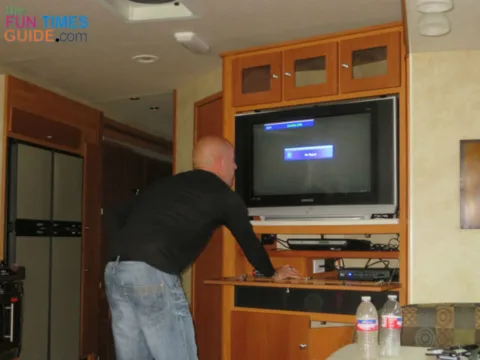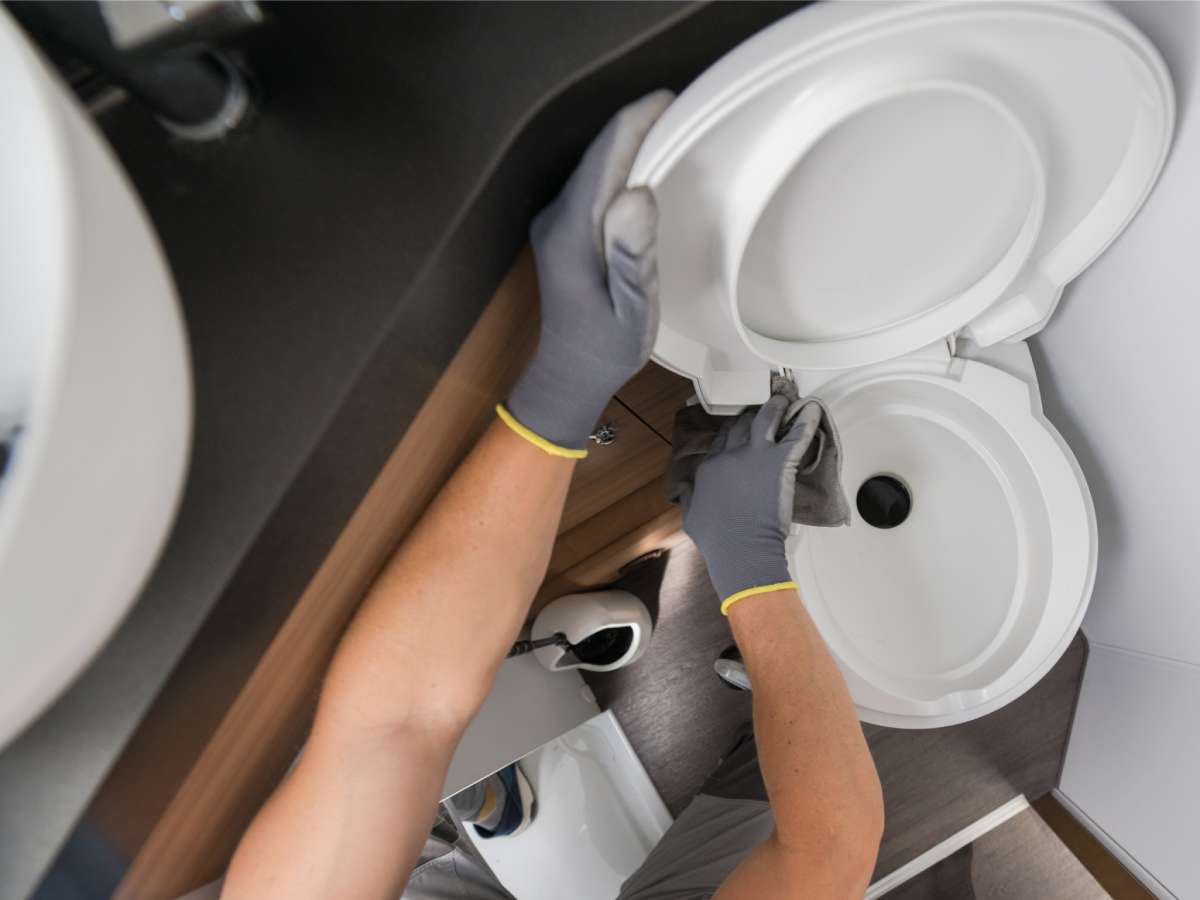Your new RV may come with a wide variety of electronic entertainment devices.
For example:
- Entry level RVs typically include a TV, an AM/FM receiver, and a DVD player.
- High-end RVs can be many times more complex with all the latest gadgets and gizmos like dropdown flat screen TVs, surround sound systems, and auto-tracking satellite receivers.
Most of the audio and visual devices on RVs are exactly like the ones that you have at home. Therefore, they require little in the way of extra training. Beyond learning which remote control operates which device, you should not have any problems.
However, there are a few minor things to remember in order to ensure that you always have a good strong picture on the TV.
RV Antenna
Mounted on the roof is your TV antenna.
In the stowed position, it lays flat and is hardly noticeable. Of course it doesn’t do much when stowed either.
To make it work, you must crank the handle that’s mounted on the ceiling to raise it into the operating position.
You have to crank it all the way up before you can turn the antenna to lock onto a signal.
 That’s right, this is a directional antenna and you must point it toward the television station you want to watch. This, of course, leads to the most common mistake RVers make: forgetting to lower the antenna when it’s time to leave camp.
That’s right, this is a directional antenna and you must point it toward the television station you want to watch. This, of course, leads to the most common mistake RVers make: forgetting to lower the antenna when it’s time to leave camp.
The lucky ones are pointed at and ridiculed by other drivers as they cruise down the highway with the antenna protruding well above the RV. I say lucky ones because, at that point, they haven’t hit anything and destroyed the antenna.
Your RV antenna is constructed of lightweight aluminum tubing and plastic pieces, so the first bump from a tree branch or a low clearance bridge will promptly snap it off.
This is why your RV antenna must be stowed when traveling.
To stow the antenna properly, simply point it in the correct direction as indicated by an arrow near the hand crank. If it’s not centered properly, it will not retract all the way and will likely snap off in the process of lowering it.
The wise RVer hangs a tag, or uses a checklist as a reminder to tend to the antenna before moving the RV.
RV Signal Booster
You have another device that greatly improves your TV signal on the RV. It’s called a signal booster. It’s located in the vicinity of your TV. The coax cable that runs from the TV goes to the signal booster, which receives the signal from the antenna.
This booster operates on 12-volt DC and has a switch and a red indicator light to signify that it’s turned on.
In most instances, without the signal booster being turned on you won’t have usable reception.
One other thing of concern is the fact that it does use electricity. It’s easy to forget that it was left on and in no time it will drain the battery of an RV that has been returned to storage after an outing.
If you’re staying at a campground or RV resort that provides cable TV, then you can hook a coax cable from their connector to the outside cable hookup (located on the side of your RV, usually somewhere near the electrical power cord area). You won’t need to do anything else. Just turn on the TV and it will be all set up.
RV Satellite Receiver
 When we were traveling full time, we took our satellite receiver with us. The auto-tracking units are nice, but in-motion RV satellite seemed a bit pricey for us.
When we were traveling full time, we took our satellite receiver with us. The auto-tracking units are nice, but in-motion RV satellite seemed a bit pricey for us.
I mounted the satellite antenna on a pole attached to the ladder on the rear of our RV. After finding the signal a few times, you will discover that it only takes a couple minutes to dial in the satellite each night when you park.
Another alternative is to purchase a portable antenna tripod. Set it up on the ground and stabilize it with a gallon milk jug filled with water. Suspend the milk jug inside the center of the tripod, and the weight will prevent the wind from tipping it over.
So there you go. Setting up your RV entertainment system is no harder than programming a VCR. All you need is a resident teenager and you’ll be just fine.
RV Entertainment System Tips
- How To Get Free TV On The Road With An RV Antenna
- Must-Have RV Equipment That Won’t Be Included With Your New RV
- Can Freezing Temperatures Harm The LCD TV In Your RV?
- How To Tell If The TV In Your RV Is Digital Or Analog
- What The Best GPS For RVers?
- Your RV Radio Options: FRS Radios, CB Radios & Ham Radios




